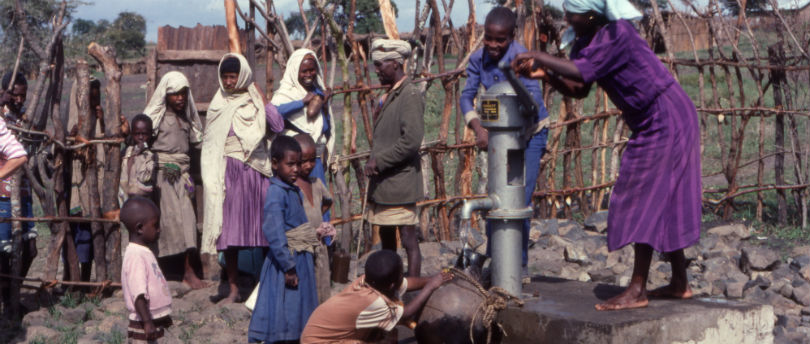Water and sanitation – why community is so important
25/02/2016

Today we attended Buckingham Palace to pick up a Queen’s Anniversary Prize for our research into water and sanitation. It is a real privilege to be recognised in this way, but what is most rewarding is knowing that our research is helping to change the lives of the most impoverished people in the world. Through our work with partners, NGOs, governments and more, water and sanitation researchers at Cranfield have already helped hundreds of thousands of people get access to clean and safe water supplies and sanitation facilities.
Water and sanitation challenges
With over 2.5bn people still without access to sanitation, the work is as important as ever. Children and adults are still dying needlessly because they can only access dirty water. But with this happening in different countries, climates and cultures, the issues are incredibly varied. In dense urban settlements, the challenge is where to site sanitation solutions in a space with no room to install conventional plumbing. For those living in rural areas like farmers in Africa, the challenge is how to maintain and service their supply in a cost-effective way.
More than a tap
Science and engineering developments have the potential to produce some truly innovative solutions that can overcome water and sanitation challenges. But I have worked in India and Africa, and what became abundantly clear to me is how important – vital, in fact – the community is in implementing solutions. Just as in the old proverb, if you give a man a fish he will eat that day, but if you give him a net and teach him how to fish, he will eat for a lifetime. Give a man a tap and he will have access to water until the tap breaks, the pipeline corrodes, and the pump bringing the water from the ground fails…
The work my colleagues and I are doing is very much about delivering the most appropriate technical solutions to social problems. But the social aspect is as important as the technical aspect to deliver a solution that actually works for the people we are trying to help. This is why we call our MSc programme an MSc in Community Water and Sanitation – community needs to be at its heart.
Talking and doing
And, we are not only talking about these issues, we are doing them. Most students on our MSc course do field work and this year, the students I am currently teaching will travel to countries like Ghana, Madagascar or India to work with organisations like WaterAid, IRC and Water and Sanitation for the Urban Poor. I feel strongly that our students should leave with more than just their Master’s – they should also truly appreciate that technical solutions are only part of what needs to be done.
Categories & Tags:
Leave a comment on this post:
You might also like…
Company codes – CUSIP, SEDOL, ISIN…. What do they mean and how can you use them in our Library resources?
As you use our many finance resources, you will probably notice unique company identifiers which may be codes or symbols. It is worth spending some time getting to know what these are and which resources ...
Supporting careers in defence through specialist education
As a materials engineer by background, I have always been drawn to fields where technical expertise directly shapes real‑world outcomes. Few sectors exemplify this better than defence. Engineering careers in defence sit at the ...
What being a woman in STEM means to me
STEM is both a way of thinking and a practical toolkit. It sharpens reasoning and equips us to turn ideas into solutions with measurable impact. For me, STEM has never been only about acquiring ...
A woman’s experience in environmental science within defence
When I stepped into the gates of the Defence Academy it was the 30th September 2019. I did not know at the time that this would be the beginning of a long journey as ...
Working on your group project? We can help!
When undertaking a group project, typically you'll need to investigate a topic, decide on a methodology for your investigation, gather and collate information and data, share your findings with each other, and then formally report ...
From passion to purpose: My journey at the Pinnacle of Aviation
By: Sultana Yassin Abdi MSc Air Transport Management, Current Student Born and raised in the vibrant landscape of the UAE, with roots stretching back to Somalia, my life has always been ...







So instead of carrying that water that last mile (or more) why not work with us to provide rotary water barrels into communities that make the differecne immediately? http://www.rotb.co.uk
Happy to discuss ways of working with you Adrian! Can you get in touch with me at a.parker@cranfield.ac.uk ?